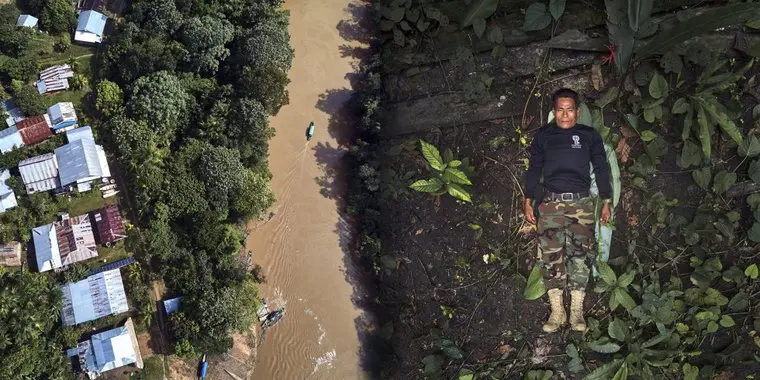
This letter features reporting from "José Gregorio: Either We Preserve the Amazon Rainforest, or the Planet Will Take Revenge" by Pablo Albarenga and Francesc Badia i Dalmases
Dear Congresswoman Sherill,
7 years, 103 days, 15 hours, 40 minutes, and 7 seconds.
This clock, showcased high and mighty in New York City’s Union Square, eerily reveals the time we have left to make drastic changes to the environment before our damage becomes irreversible. The neglect of a ticking time bomb is unconscionable as the prospect of the lives of future generations will be put at risk. With fearsome epidemics like low water and food supplies, drought, and severe weather patterns, life as we know it will not exist anymore and normalcy will feel very similar to how it feels in a global emergency like COVID-19. The buzzing metropolitan area we live in faces threats of sea levels rising, wiping out the economic and cultural hub of the world. In an article entitled “Either We Preserve the Amazon Rainforest, or the Planet Will Take Revenge,” Indigenous activist José Gregorio from Colombia stresses the need to save his people's home from the already visible effects of climate change, emphasizing the same tactics our own country needs to take in order to have future generations live freely. Gregorio and his tribe initiated an environmental guard patrol, protecting their Indigenous land from illegal (and legal) oil miners and loggers who have caused their home to take an extremely unhealthy turn. Ecosystems that used to prosper have now been stripped of their resources along with many organisms going extinct. This invasion of the ecosystem and the world’s biggest carbon sink also invades Gregorio's tribes’ land, a place they have lived for centuries.
The threat to our area is just as prevalent, and is getting to the point where the lack of a right to a clean ecosystem is a lack of rights to our land. The effects of climate change are already being seen here, such as drought, extreme weather patterns, lack of snow, and poor air and water quality. The success of the tri-state area will mean nothing in the future if we are unable to sustain an inhabitable environment, with our resources and habitats not being as plentiful and healthy as they once were. Gregorio emphasizes that there will come a time where we will no longer be able to make our own choices on our lives and where to live, and at some point the Earth’s state will drastically change our way of life, leaving us without control. “At some point, nature will make decisions for us," Gregorio says. "And when it does, for us no one will have the power to control it. The sun will take revenge, and there will be no stopping it.” The closest thing we had to our own “environment patrol” would be the EPA or deals with other countries like the Paris Climate Accord. With the U.S. pulling out of these deals and defunding the EPA, there is no outlook or control over our carbon footprint and overharvesting of our natural resources. It is crucial to follow other leaders around the world like José Gregorio, who have seen first hand the effect of climate change on their own communities. It is even more important to take action and set up similar “patrol groups” like the EPA or deals with other countries.
Congresswoman Sherill, I am calling on you to put forth a stronger initiative to take the climate change issue very seriously with the rest of our government. While there are many other issues of great importance, the threat of an uninhabitable Earth in the upcoming years is very likely. In the next seven years, New Jersey must work towards net-zero carbon emissions to prevent the further warming of the atmosphere. This can be done with investments in renewable energy, such as windmills, solar, and geothermal, all industries that can be extremely successful in the future. New Jersey can also provide tax incentives for businesses who make the switch to renewable energy, motivating more people to make the cleaner decision. We could also do this for citizens when buying cars, giving them a break when choosing an electric car instead of a gas powered car. We also need to call on car manufacturers to begin developing more electric cars and ones that are affordable to working class Americans. Furthermore, New Jersey must preserve more areas for forests and reservations, along with cleaning up our polluted rivers such as the Passaic River, once a habitat for many animals. This will create many jobs around New Jersey as there are many areas that need to be remediated. Please remember that with all these initiatives, there is a time limit. Despite equally important issues that are piling up in the U.S., they will not be able to be solved until we are certain that humans will be alive to see them in the next century. With a healthy and stable environment, the U.S. will be able to see the solution to many systemic and societal problems that are before us. With your support, New Jersey can open up an entire new industry in renewable energy, letting us prosper both economically and environmentally.
Sincerely,
Ava Agostinelli

Ava Agostinelli is a senior at Montclair High School in Montclair, New Jersey. As a member for the Center for Social Justice, she values the importance of advocacy for equity across all social groups and systemic change. With her love for plants along with social justice, Ava is very passionate about the need for action within the Climate Change crisis. Her foremost passion is dance, and she is a member of Danceworks & Co. in Montclair and the Dance Company at her school.
Read more winning entries from the 2020 Local Letters for Global Change contest!